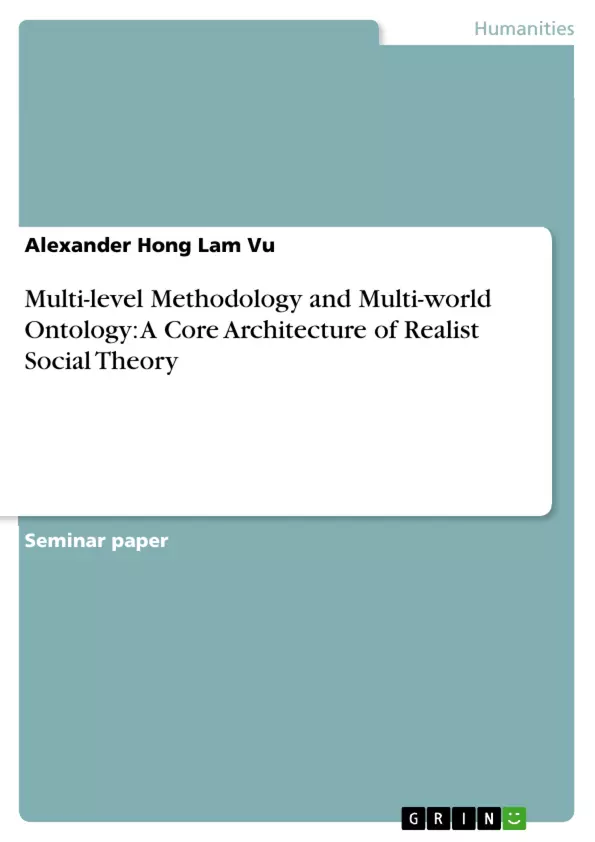Abstract: The central problem of social theorizing lies in the relations or mediations between system (in particular, structure and function), agency (particularly,action and subject) and time (in particular, history and process). Historically, these problems can be grouped in what I call the four micro-macro problems. In this paper, I show that Margaret Archer's "morphogenetic approach" can be seen as an attempt to simultaneously address these four micro-macro problems. Reconstructing a core architecture of Archer's model of sociological explanation, the "analytical dualism," I argue that this is a marriage of a two-level methodology based upon the distinction structure/interaction and a three-world ontology based on Karl Popper's metaphysics. As such, Archer's social theory shares a basic feature with Jürgen Habermas's "theory of communicative action," Bernhard Giesen's "evolution-theoretical model," and Manfred Hennen's and Elisabeth Springer's "basic schema of action theories." By pointing that out, I propose a hypothesis that a solution for the four-fold micro-macro problem would be a construct combining a multi-world ontology that allows the possibility of emergence in social reality and a multi-level methodology that provides a linkage between the different levels of social life.
[...]
Inhaltsverzeichnis (Table of Contents)
- The Four Problems of Social Theorizing
- The Two Levels of Facts
- The Three Worlds of Emergent Entities
- The Interplay Between Levels and Worlds
- A Hypothesis for Further Research
Zielsetzung und Themenschwerpunkte (Objectives and Key Themes)
This paper aims to reconstruct the core architecture of Margaret Archer's "realist social theory," demonstrating its components and their relationships. It argues that Archer's theory, "analytical dualism," combines a two-level methodology based on structure/interaction with a three-world ontology based on Karl Popper's metaphysics. This approach provides a framework for understanding the complex interplay between social structures, individual agency, and social change.
- The micro-macro problem in social theorizing
- Margaret Archer's "realist social theory" and its response to the micro-macro problem
- Analytical dualism: A two-level methodology and a three-world ontology
- Emergence and its role in social reality
- The interplay between levels and worlds in social life
Zusammenfassung der Kapitel (Chapter Summaries)
- The Four Problems of Social Theorizing: This chapter introduces the central problem of social theorizing, which lies in the relationship between system, agency, and time. It outlines four main micro-macro problems: Local vs. Global, Static vs. Dynamic, Circular vs. Open, and Continuous vs. Discontinuous.
- The Two Levels of Facts: This chapter explores the distinction between social integration and system integration, which forms the basis of Archer's analytical dualism. Social integration refers to interactions at the micro level, while system integration refers to structures at the macro level.
Schlüsselwörter (Keywords)
This paper focuses on key concepts such as micro-macro problems, realist social theory, analytical dualism, emergence, structure, agency, time, social integration, system integration, multi-level methodology, multi-world ontology, and the three worlds of Karl Popper.
Frequently Asked Questions
What is Margaret Archer's "Morphogenetic Approach"?
It is a realist social theory that explains how social structures and human agency interact over time to produce social change or stability.
What does "Analytical Dualism" mean?
It is a methodological tool that separates structure and agency for analytical purposes, recognizing that they operate on different timescales and have different properties.
How does the "Three-World Ontology" relate to social theory?
Based on Karl Popper's metaphysics, it suggests that social reality consists of physical, mental, and cultural/structural worlds that emerge from one another.
What are the four micro-macro problems in social theorizing?
They involve the relations between Local vs. Global, Static vs. Dynamic, Circular vs. Open, and Continuous vs. Discontinuous processes.
What is the difference between social and system integration?
Social integration refers to the interactions between actors (micro-level), while system integration refers to the relations between parts of the social structure (macro-level).
- Quote paper
- Alexander Hong Lam Vu (Author), 1999, Multi-level Methodology and Multi-world Ontology: A Core Architecture of Realist Social Theory, Munich, GRIN Verlag, https://www.grin.com/document/1212



